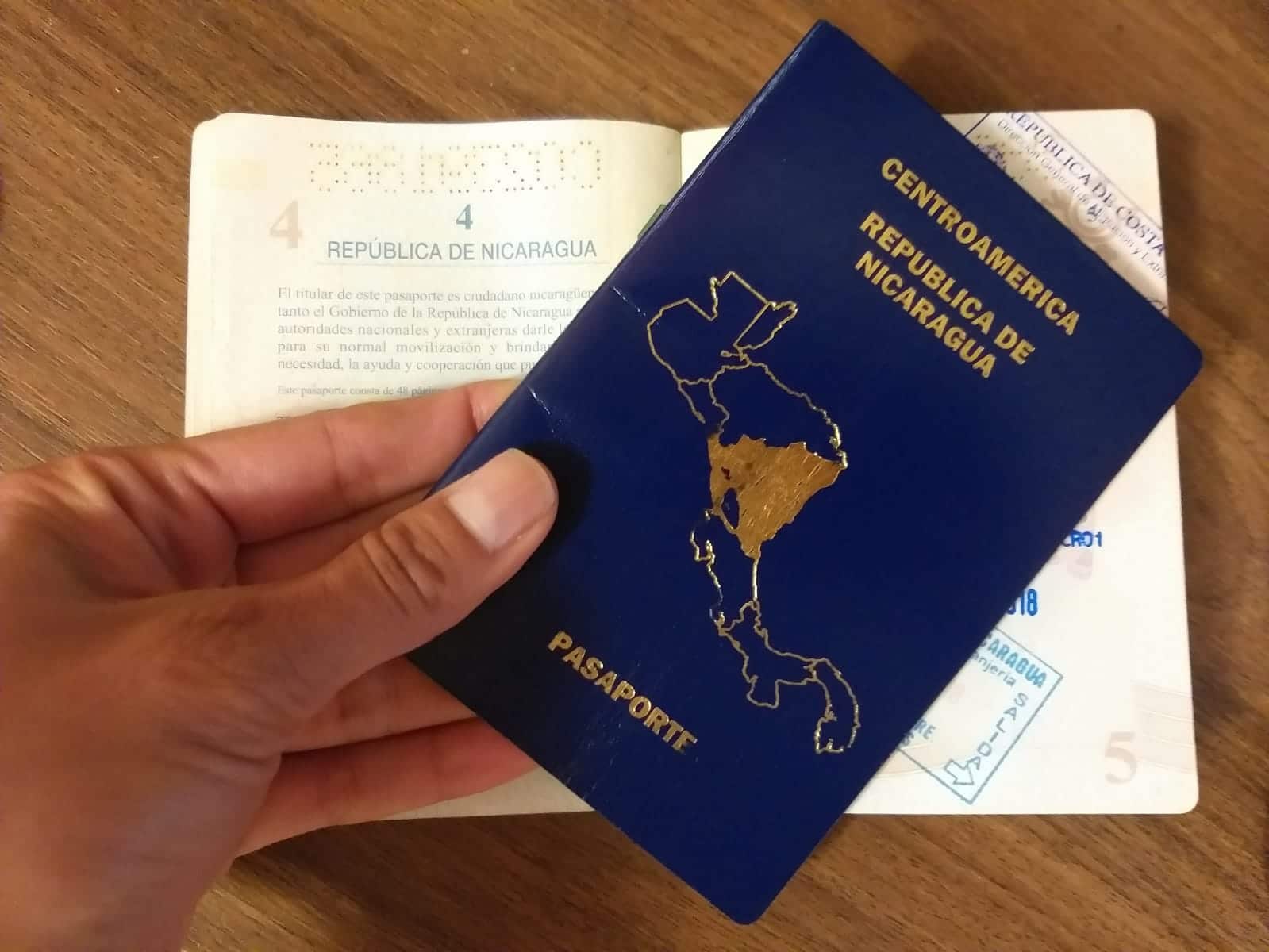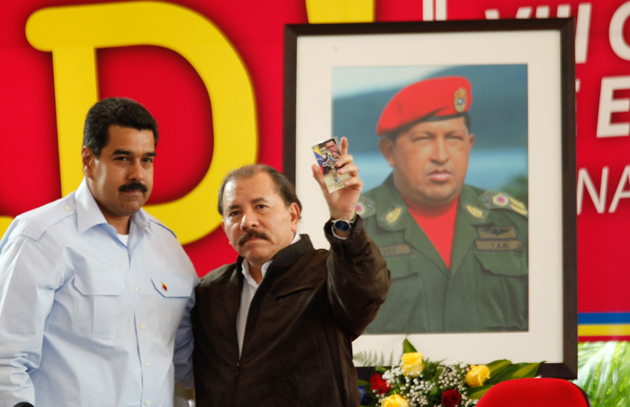
Nicaragua: Public Employees Hindered from Traveling to USA

PUBLICIDAD 1M
PUBLICIDAD 4D
PUBLICIDAD 5D
Daniel Ortega has consolidated his authoritarian model of government thanks to the oil deal with Caracas

No es extraño que los de izquierdas
Contrasting with the surprise vote in the United States, in November, other presidential elections were held in the region which did have a predictable outcome. With over 72% of votes, Daniel Ortega was reelected as President of Nicaragua for his third consecutive term.
The main reasons for Ortega’s victory were the implementation of social programs which reduced poverty, the supposedly good state of public finances and the exclusion of the competition with his opposition which was the result of decisions by the electoral authorities and the judiciary. However, behind these reasons lies the important influence of another country: Venezuela.
When he became president in 2007, the first thing Daniel Ortega did was to sign his membership in the Bolivarian Alliance for the Peoples of Our America (ALBA). Two months later, Nicaragua’s National Assembly approved the country joining Petrocaribe, a scheme which has allowed its member states to be supplied with Venezuelan oil under extremely favorable payment conditions.
However, Venezuelan “partnership” has been a great deal more advantageous for Nicaragua than it has been for the rest of the Petrocaribe countries. The modus operandi of how this agreement was put into practice has ensured that Ortega’s government would receive funds without these being included in the national budget. Namely, Nicaragua’s state-run Petronic – via a joint business called Albanisa created with Venezuela’s PDVSA – which imported Venezuelan oil and although it cancelled the bills within 90 days, PDVSA gave credit in cash for 50% of these invoices to a private cooperative controlled by the Sandinista Front leadership known as the Caja Rural Nacional (Caruna).
This triangle model allowed resources coming from PDVSA to be used without any kind of auditing or controls. According to the International Monetary Fund, between 2008 and 2012, 62% of funds given by Venezuela were destined to “profitable projects” carried out by at least 60 private companies which were either under Ortega’s direct influence or control and which were dedicated to a wide range of activities such as construction, telecommunications, tourism, security and exploting forests and agriculture. Only the remaining 38% were directed to financing food social programs, credit and building housing.
Recently, it has come to light that since 2012, PDVSA legal advisors have been questioning why funds were transferred to Caruna as this created the risk of not being able to get debt repayment. Until the end of 2015, these funds were over 3.6 billion USD and Ortega’s government has always insisted on treating them like they were “private debt”. In fact, the Venezuelan government demanded that Nicaragua hand over some kind of “sovereign guarantee” in order to support the debt, but all they received were a few IOUs issued by Caruna.
In the end, in April 2016, it became known that all of Caruna’s assets and liabilities were transferred to Albanisa, which in practice represents at least half of the existing debt being forgiven as PDVSA is the owner of 51% of the company’s shares. Meanwhile, PDVSA transferred its part of the debt to the Venezuelan Central Bank, trying to convert the extravagant liabilities into “sovereign debt” which would be redeemable from the Nicaraguan State and not a private limited liability partnership.
Ultimately, this means that between 2008 and 2015, Venezuela financed Daniel Ortega’s government with over 4.4 billion USD, divided into loans, donations and foreign investment via Albanisa. Meanwhile, a large part of Venezuela’s partnership has already been paid by Nicaragua by having exported products such as meat, sugar, coffee and livestock, at higher prices than those on the international market. According to the Nicaraguan Center of Export Proceedings, Nicaragua exported over 400 million USD to Venezuela in food alone in 2012.
In proportion, just like the Nicaraguan politician Edmundo Jarquin has explained, Venezuela’s funding to Nicaragua represents more than double that which the Panama Canal contributes to the Panamanian state budget in a year. On the average, Venezuela has given Nicaragua over 500 million USD per year in funds, which is the equivalent to approximately 6% of Nicaragua’s Gross Domestic Product between 2008 and 2015.
Just like in Venezuela, the surplus of the funds which Ortega received allowed him to consolidate an authoritarian regime whose main characteristics are control of public authorities, media and clearly weakening the rule of law, this leading to a drastic cut in the rights of Nicaragua’s opposition’s.
In spite of the fact that Nicaragua is the third poorest country in Latin America, thanks to Venezuela, it has been able to get by without international cooperation programs offered by the United Nations, the European Union and the United States. At the same time, the sufficient means which have been created due to Venezuela’s partnership has also led to such an important fiscal stability that Nicaragua has been able to increase its access to funding from institutions such as the World Bank and the Inter-American Development Bank. Furthermore, Ortega has been able to finance, without any controls, social programs, extending his party’s support base and the citizens’ dependence on the State.
However, maybe the most transcendental aspect about Venezuela’s partnership with Nicaragua has been that it has allowed Daniel Ortega’s government to create an important mix of companies, being able to take over different media and develop commercial interests in Nicaragua which have got rid of any kind of incentive or need to cooperate with or understanding with other political parties or civil society. Unlike Venezuela, both on a national and international level, an implied tradeoff has been reached, as many have turned a blind eye to the implementation of an authoritarian regime given the fact that certain sensible economic policies remain in place.
With the economic collapse which Venezuela is currently experiencing, Nicaragua is in big trouble. Venezuela’s partnership has already been cut by 37% in the first six months of 2016. But Daniel Ortega has already consolidated his authoritarian project.
The irony of it all is that it was the Venezuelan government, the recurring defender of the principle that a country’s domestic affairs shouldn’t be meddled with, which has been the one to put the exact opposite into practice. The reality is that Venezuela has strengthened a political leader [Ortega] and his party [FSLN] with so many resources that it has eliminated the chance for democracy to be exercised.
Therefore, Venezuela’s partnership with Nicaragua is, in effect, an agreement where neither national Venezuelan interests are taken into account nor the wish to work together in helping Nicaraguans make progress. The intention was rather to finance a political trend which would allow Ortega to stay in power. And it’s no small thing that the governments of Hugo Chavez and Nicolas Maduro have managed to do it using resources which, in theory, belong to all Venezuelans.
PUBLICIDAD 3M
PUBLICIDAD 3D